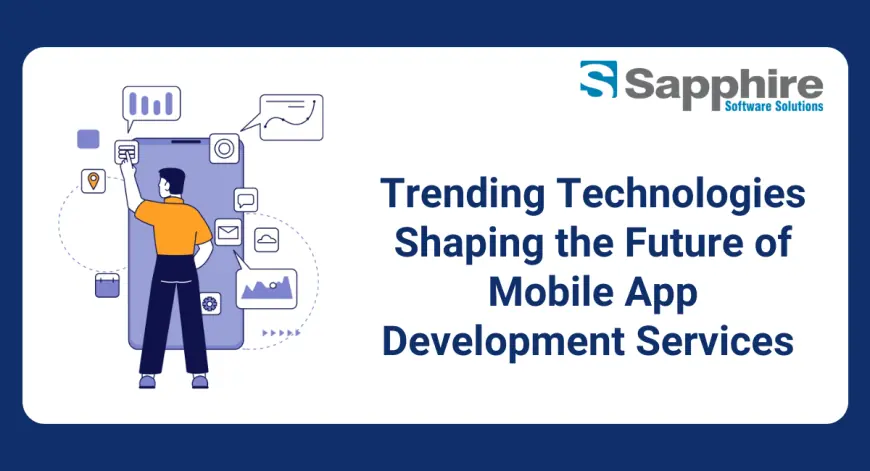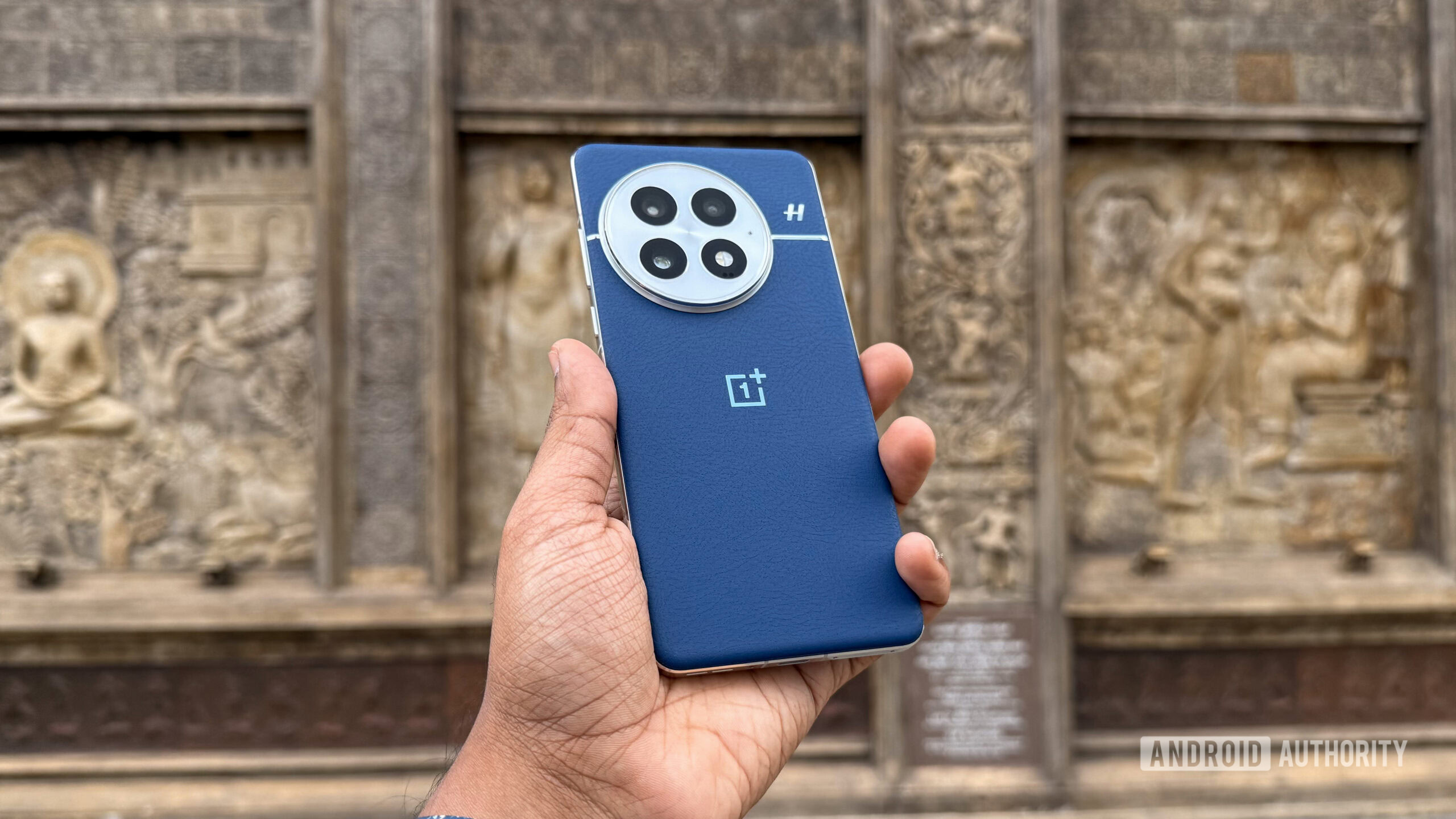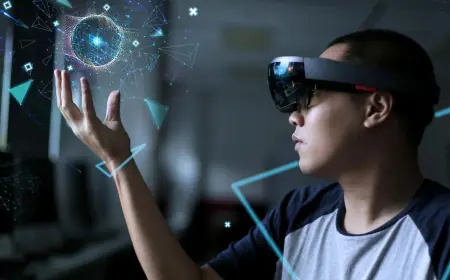Trending Technologies Shaping the Future of Mobile App Development Services

The mobile app development industry is continually evolving, driven by advances in technology, changing consumer preferences, and business needs. As businesses adopt mobile-first strategies, staying ahead of the curve in terms of technological trends is essential for mobile app developers. In this article, we’ll explore the cutting-edge technologies shaping the future of mobile app development services.
1. Artificial Intelligence (AI) and Machine Learning (ML)
Artificial Intelligence (AI) and Machine Learning (ML) are transforming how mobile apps operate. Both technologies allow for apps to provide a customized experience, enhance user engagement, and streamline app functions AI and ML assist mobile apps in learning from user activities, making instantaneous predictions and updates that enhance user experience.
For example, chatbots using AI can be used for 24/7 customer care, whereas ML algorithms can offer content suggestions, forecast user intent, and find anomalies. The extent of such personalization is fast becoming an expected norm amongst users; hence AI and ML have become indispensable tools for contemporary mobile applications.
Mobile App Development Impacts:
•customized user interfaces
•intelligent assistants and bots
•sophisticated data analysis for decision making
•predictive analytics and suggestion
2. 5G Connectivity
5G technology is going to revolutionize the mobile app development landscape. With its low latency, high-speed internet, and massive connectivity, 5G Connectivity will open up new doors for mobile apps, particularly in fields like gaming, augmented reality (AR), virtual reality (VR), and IoT (Internet of Things) applications.
With 5G, mobile applications will provide smoother experiences with lesser delays, and that too is crucial for real-time use cases such as video streaming, gaming, and IoT devices. The high bandwidth will allow mobile applications to handle larger amounts of data and provide richer multimedia experiences, enhancing user engagement and satisfaction.
Effect on Mobile App Development:
• Latency-free, high-speed connectivity
• Improved video streaming and gaming experience
• Real-time data processing for IoT devices
• New AR/VR experience opportunities
3. Augmented Reality (AR) and Virtual Reality (VR)
AR and VR are not buzzwords anymore—they are starting to become a vital aspect of mobile app creation, especially for industries such as gaming, e-commerce, education, and healthcare. AR allows users to engage with digital content placed on the real world, while VR engages users in an entirely digital setting. Mobiles are getting more powerful, making it simpler to incorporate AR and VR into applications.
E-commerce apps are using AR to enable customers to see products in their environment before buying, and gaming apps provide engaging VR experiences. In healthcare and education, AR and VR are being employed for simulations, training, and remote consultations, greatly improving how users interact with mobile apps.
Impact on Mobile App Development:
• Immersive user experiences in gaming, education, and e-commerce
• Greater use of AR for product visualization
• Virtual simulation and training across industries
• Increased interaction with digital content
4. Blockchain Technology
Blockchain is most famously associated with cryptocurrencies, yet the scope of its potential impact on mobile app development is vast. This decentralized platform offers a safe, transparent, and immutable means of storing and exchanging data. Mobile applications that necessitate secure transactions, including banking, e-commerce, and health apps, are all starting to use blockchain technology.
Apart from increasing security, blockchain development facilitates decentralized applications (dApps), which operate on peer-to-peer networks instead of centralized servers. This provides a platform where users gain greater control over their data, and transactions are transparent and unalterable.
Effect on Mobile App Development:
• Improved security and data protection
• Transparency in user interactions and transactions
• Decentralized apps and services
• Increased trust in financial and healthcare applications
5. Cloud Computing
Cloud computing has been a revolution when it comes to mobile app development. Cloud computing enables developers to create scalable, flexible, and affordable mobile applications without investing much in hardware infrastructure. Cloud computing power and cloud-based storage capabilities enable mobile apps to easily store and manage great volumes of data, which enables a smooth user experience across devices.
Cloud platforms such as AWS, Microsoft Azure, and Google Cloud have simplified the process of mobile app development and management for mobile app developers, as they offer a variety of services including real-time data synchronization, backup solutions, and hosting. With mobile apps becoming increasingly integrated with cloud technologies, users can anticipate faster, more responsive, and always available apps.
Impact on Mobile App Development:
• Scalability and flexibility for app growth
• Real-time synchronization of data across devices
• Economical storage and computation
• Intuitive backup and recovery of data
6. Internet of Things (IoT)
The Internet of Things (IoT) is a network of connected devices that are able to talk to and exchange information with one another. As more devices are made IoT-enabled, mobile applications are increasingly being used as the hub for controlling and monitoring the devices. Smart home appliances, wearables, and healthcare devices are all being added to the expanding IoT universe, and mobile apps are responsible for managing them.
IoT mobile applications are revolutionizing sectors like manufacturing, healthcare, and logistics through real-time monitoring and analysis. For example, healthcare apps can monitor patient data from wearable technology and send recommendations to doctors in real-time IoT is increasing the capabilities of mobile apps to include automation and smart technology, making them invaluable in everyday life.
Influence on Mobile Application Development
• Remote monitoring and control of IoT devices
• Real-time analysis and feedback of data
• Automation and optimization in industries such as healthcare, agriculture, and manufacturing
• Context-aware and connected user experiences
7. Cross-Platform Development Frameworks
Previously, creating a mobile app required one to develop individual versions for iOS and Android. This changed with the emergence of cross-platform development, with which developers can now build apps that operate effortlessly on multiple platforms from a single codebase. There are many popular frameworks such as React Native, Flutter, and Xamarin, with which developers can develop high-performance, native-like applications with less effort.
Cross-platform frameworks are time-saving, and cost-effective, and ensure uniformity across devices, thus making them the first choice of companies looking to target a wider audience without compromising on quality. With such frameworks getting better and better, developers can look forward to even more effective tools to create cross-platform apps.
Impact on Mobile App Development:
• Decreased development time and expense
• Uniform user experience across platforms
• High-performance apps with native-like capabilities
• Rise in use of Flutter and React Native
Conclusion
The future of mobile app development services is promising and full of possibilities, due to the fast rate of technological innovation. From 5G and AI to blockchain, AR, and IoT, these new technologies are not just enhancing the features of mobile apps but also reshaping industries and improving user experience. As companies continue to adjust to the ever-evolving digital world, integrating these technologies will be the determinant of competitiveness and providing innovative solutions to users.
The future of Mobile Application Development Services will most certainly be determined by these trends, and the developers who maintain pace with such innovations will have a great platform to develop applications that address tomorrow's digital era.
What's Your Reaction?
 Like
0
Like
0
 Dislike
0
Dislike
0
 Love
0
Love
0
 Funny
0
Funny
0
 Angry
0
Angry
0
 Sad
0
Sad
0
 Wow
0
Wow
0























































